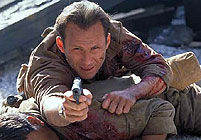|
|
|
|
Windtalkers
|
 |
|
Ten years before this film, John Woo was at the cutting edge of popular cinema. At the height of his career in Hong Kong, the action film Hard Boiled (1992), starring the charismatic Chow Yun-Fat, dazzled his devoted fans with its bold mixture of thrills, emotion and cinematic experimentation. The generic formulae for action and comedy were not all that Woo had mastered by then. His excursion into historical war drama, Bullet in the Head (1990), showed Woo in a more ambitious vein, emulating his idols such as David Lean and Akira Kurosawa. But then Woo went to America. None of the films made since his relocation (Hard Target [1993], Broken Arrow [1996], Face/Off [1997], Mission: Impossible 2 [2000] and Paycheck [2004]) are entirely bereft of pleasing Woo touches. But he has been unable to regain the vanguard position he had in world cinema at the start of the '90s. Windtalkers rates among the saddest hours I have spent at the movies in recent years. Not because of its content, but because of the low point to which Woo has sunk. In some senses it is the smoothest American film he has done, one which actually figures out a comfortable place for his vision as an ethnic and cultural outsider. But this comfort comes at a high price. There is hardly a single scene or shot in Windtalkers that exhibits the style which once made Woo's work so exciting. It is a laboured tale based on an unusual aspect of American military history. During World War II, the army comes up with the bright idea of using the Navajo language as the basis for an uncrackable code. Every 'windtalker' is paired off with a protector whose solemn duty is to kill his partner if necessary, to ensure the code does not fall into enemy hands. Thus begins the fraught friendship of Joe (Nicolas Cage) and Ben (Adam Beach). Joe, knowing his mission, decides to stay aloof from Ben; the latter regards this standoffishness as a typical manifestation of white racism. When another windtalker dies in combat, the tension between the two men increases. This would have been a better story if Joe had actually been a hard-boiled racist, not just someone pretending to be. Because the film cues us into his secret sensitivity from the word go, there is no tearing contradiction at its heart. Woo has had always had a soft spot for sentimentality, particularly when it comes to the hallowed buddy-relation between men of action, but here the sanctimonious sogginess is unbearable. There are some Woo devotees who see this film as a welcome, personal project. As if to find a way to express his own viewpoint as a non-American director within the American system, Woo latches onto the noble culture of the Navajo and treats it with plodding earnestness. And, like his old Hong Kong movies, it is extraordinarily discreet by contemporary standards. Only a passing allusion to "lonely nights" in the letter sent by Joe's sweetheart, Rita (Frances O'Connor), hints at any sexual dimension to human behaviour. Even the battle scenes are dreary, which I would have thought impossible from a director of Woo's kinetic skills. Perhaps in a bid for seriousness, he plays down the spectacular elements of his previous work. The trademark slow motion shots, dazzling editing, bold use of colour and sound – all this is gone. What's left in the place of this once-feverish syntax is a bunch of images of actors in close-up looking shell-shocked and teary. And on the level of the deep and meaningful, Windtalkers cannot hold a candle to The Thin Red Line (1998). It is possible that, if this film wasn't signed by Woo, I might like it better. Disappointment over the downward path of Woo's career heightens my sense of how conventional and unexciting this material is in his hands. As an ordinary war drama, Windtalkers has points of interest. But as a Woo film it is null and void. © Adrian Martin August 2002 |
![]()